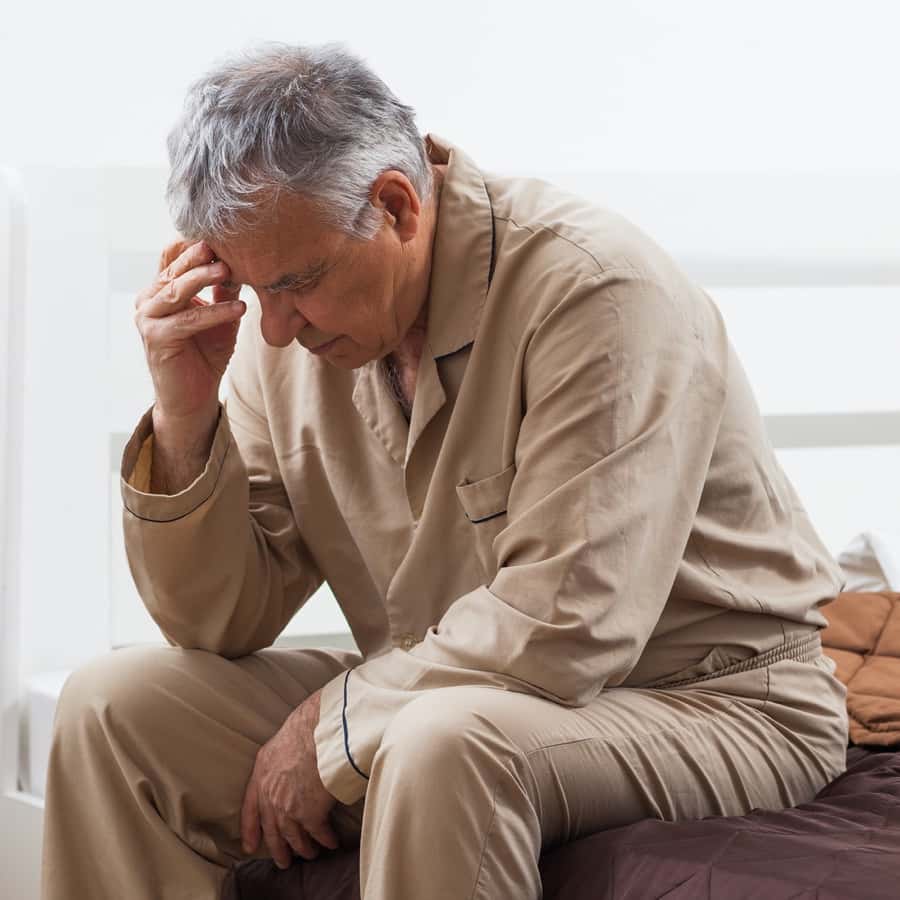
According to the CDC, 33% of Americans don’t get adequate sleep. Chronic insomnia is linked to all sorts of serious health problems including diabetes, hypertension, obesity, heart disease and depression. In addition, many people feel less alert the day after taking a sleeping pill. As a result, they are more susceptible to automobile accidents. Not all those people have trouble falling asleep. Many individuals fall asleep without difficulty but wake up in the middle of the night to pee and can’t get back to sleep. This woman shares a familiar story:
Q. My husband has tried many sleep aids over the years, but they don’t KEEP him asleep. He falls asleep in just minutes but wakes up about four or five hours later and cannot get back to sleep.
He currently takes trazodone and it doesn’t help. Neither have Ambien (zolpidem), Lunesta (eszopiclone) or melatonin.
He is active during the day. He tried counseling, but dropped out and refuses to go back. Do you have any ideas that might help?
A. There are two prescription medications that are supposed to help with this problem. One is sublingual zolpidem. It is for treating insomnia “when a middle-of-the-night awakening is followed by difficulty returning to sleep.”
Sublingual Zolpidem If You Can’t Get Back to Sleep:
Zolpidem is the active ingredient in the prescription sleep pill Ambien. When taken as a sublingual tablet (under the tongue), it goes to work more quickly.
This is only appropriate if there are at least four more hours for sleeping before time to get up, though. If your husband has to get up in two or three hours, he may have morning grogginess and might not be able to drive safely. It may also cause nausea or headache.
Other Zolpidem Side Effects:
- Fatigue
- Mouth ulcers, blisters, mucosal irritation (from the pills)
- Driving impairment the next day (with less than 4 hours of sleep after taking Intermezzo)
- Severe allergic reaction (anaphylaxis) and angioedema (swelling) of tissues involving the tongue and throat
- Abnormal behavior: People taking zolpidem have experienced unusual behavior including aggressiveness and agitation. Some have reported sleep walking, sleep eating and sleep driving. The FDA requires a black-box warning about such “complex sleep behaviors” in the prescribing information for zolpidem.
Silenor If You Wake Up and Can’t Get Back to Sleep:
Silenor (doxepin) is for “the treatment of insomnia characterized by difficulty with sleep maintenance.” That is a fancy way of describing your husband’s problem.
This antidepressant medicine can also cause next-day drowsiness, nausea or a rise in blood pressure. Unlike Intermezzo, which is taken if and when the patient wakes up, Silenor is taken half an hour before bedtime.
Other Silenor Side Effects:
- Sedation, performance impairment the day after taking Silenor
- Dizziness
- Upper respiratory tract infections
- Digestive upset
- High blood pressure
- Rash, sensitivity to sunlight
- Suicidal thoughts, worse depression
- Blood disorders, anemia
- Sensitivity to heat, heat stroke
Doxepin also has anticholinergic activity. Will it affect brain function? Here is a link to an article we have written on this topic.
Natural Remedies to Help Get Back to Sleep:
Your husband will need to discuss either of these with his doctor. He might also try a natural remedy. According to Tieraona Low Dog, MD, California poppy can also help a person stay asleep, especially if muscle pain or cramping is waking him up. Look for a tincture of Eschscholzia californica. This is not an opium poppy.
What Is the Difference Between Tablets and Sublingual Forms of Zolpidem?
Q. A while back, your newspaper column provided an answer to a man who woke up too early and couldn’t get back to sleep. There are medications that are supposed to help, like sublingual zolpidem. It contains the same ingredient as Ambien and is taken under the tongue for faster relief.
I am taking zolpidem as a pill I swallow with water. What’s the difference between sublingual zolpidem and what I am taking?
A. We recently received a comment from a reader who occasionally puts a piece of a zolpidem tablet under the tongue to fall asleep. That do-it-yourself approach might not result in reliable dosing. The sublingual formulation is specifically designed to help people get back to sleep after waking in the middle of the night. The dose is 1.75 mg for women and 3.5 mg for men. Anyone over 65 should take the 1.75 mg dose, since older people may metabolize this compound more slowly.
Learn More:
Anyone who would like to learn more about how to fall asleep naturally or get back to sleep may find our recently revised Guide to Getting a Good Night’s Sleep helpful. It also includes more information about zolpidem and other strategies for insomnia.
Share your own sleep story below in the comment section.

